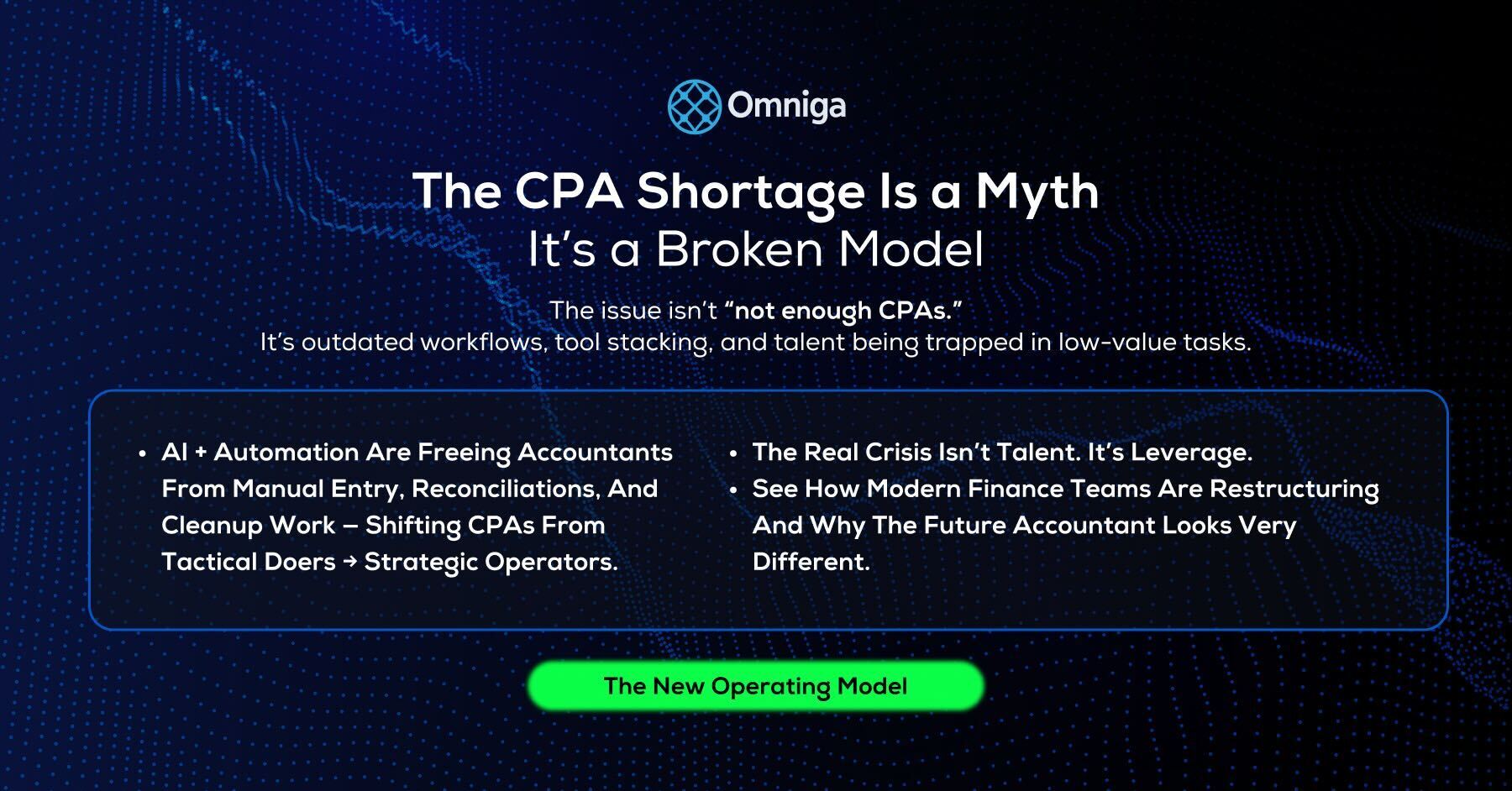The CPA Shortage Is a Myth — It's a Broken Model

The CPA shortage is a myth—broken processes cause the real crisis. See how AI and automation are transforming accounting talent in 2025.
Table of Contents
Introduction
For years, the business press has sounded the alarm about a looming CPA shortage. Fewer accounting graduates. A decline in CPAs taking the exam. Baby boomers retiring in droves. Meanwhile, demand for financial transparency, regulatory compliance, and accurate reporting continues to rise.
The numbers are stark: CPA exam candidates dropped from 72,271 in 2021 to just 67,335 in 2022, while approximately 75% of CPAs are Baby Boomers approaching retirement age. Meanwhile, the number of accounting graduates fell 7.8% in 2021-22 to just 47,067 bachelor's degrees — the sharpest single-year decline in nearly three decades.
It all paints a compelling picture. But what if the so-called CPA shortage in 2025 isn't the real problem? What if this accounting talent shortage narrative misses the deeper issue?
The broken accounting talent pipeline isn't about fewer candidates — it's about a fundamentally flawed system that wastes the talent we have.
This is driving many companies toward alternative models like fractional CFO that maximize talent efficiency and provide strategic expertise without full-time overhead.
What if the crisis isn't one of talent, but one of leverage?
What if we haven't run out of accounting professionals?
We've just been using them wrong.
The Myth of the Accounting Talent Shortage
Let's start with what's true: fewer people are pursuing the CPA credential. The 150-hour requirement adds cost and delay, choking the accounting talent pipeline before candidates even begin. This barrier is having measurable impact: first-time CPA exam candidates plummeted 33% from 48,004 in 2016 to just 32,188 in 2021. Since 2010, the total number of accounting graduates has decreased by 20%, while there are around 340,000 fewer accountants now than there were five years ago.
The CPA exam is a high-stakes, low-ROI hurdle for many. And public accounting, once a stable career path, has become a grind with poor work-life balance.
But the idea that there simply aren't enough CPAs to meet demand misses the deeper truth behind this accounting workforce shortage:
Accounting work hasn't evolved.
Accounting teams have grown, not because the work has become harder, but because the processes are broken. And instead of fixing those processes, most companies stack tools and headcount in an attempt to keep up.
The result? Bloated departments, redundant workflows, and CPAs doing work well below their skill level.
The decline in CPAs is not a talent crisis — it's a process crisis. And that misdiagnosis is holding back the entire function.
Learn more about why accounting talent is underutilized and how it impacts strategic finance.
Why the Accounting Model Is Broken
The accounting skills gap isn't about education or certification — it's about how we structure the work itself.
1. Process Improvement Is No One's Job
Most companies don't have anyone explicitly responsible for redesigning internal finance workflows. FP&A teams focus on forecasting. Controllers focus on the close. Everyone's buried in recurring tasks.
Even the largest consultancies have reinforced this broken model — as we explore in why the Big 4 has failed FP&A, their approach often props up outdated structures rather than solving the root inefficiencies.
So instead of improving the system, businesses just add more accounting software or people.
Tools don't fix bad processes. They just hide them longer.
2. CFOs Lack True Capacity Metrics
CFOs usually control accounting headcount. But the only performance metric they track is often days-to-close — a benchmark that hasn't materially improved in over 15 years.
What they miss is how much of the work is:
- Manually entered
- Re-keyed across disconnected systems
- Reconciled late
- Or duplicated entirely
Without visibility into accounting process efficiency, bloated teams become the norm, exacerbating apparent accounting recruitment challenges.
The retention crisis compounds this problem. A 2022 Deloitte survey found that 82.4% of hiring managers for accounting roles at public companies struggle with talent retention, while EY announced a more than 10% salary hike for accountants in 2025 as part of a $1 billion investment aimed at reversing the shortage.
3. Technologists Are Focused on the Top Line
Even in product-led companies, engineering resources go toward revenue — not automation for the back office.
So finance leans on SaaS tools, hoping they'll patch the gaps. But they rarely support true accounting automation. This reflects a broader need to rethink the quickbooks alternatives, not just add more apps.
4. Tool Stacking Feels Cheap — But It's Not
Tools like QuickBooks, Bill.com, Gusto, Expensify, and Excel all look affordable on their own.
But together, they:
- Require manual stitching
- Introduce sync issues
- Multiply reconciliation effort
And most critically, they don't reduce the burden on people.
Because tech stacks aren't evolving fast enough, the best use of AI may be to recognize the patterns of error they create and notify you of the fix — not just post transactions, but surface anomalies across disconnected workflows.
This is the future of automated accounting workflows — orchestration over execution.
5. CPAs Are Trapped in Tactical Work
Week after week, highly trained professionals spend time:
- Fixing vendor miscodings
- Manually tagging transactions
- Cleaning up invoices
These are tasks that should be automated through accounting process automation.
But current tools can't manage exceptions, explain decisions, or adjust in real time. So humans step in — and stay stuck in the weeds.
How AI Addresses the Accounting Skills Gap
Accounting tech has historically failed to deliver real automation because the data is messy and the rules are rigid.
But modern AI is changing that. It can now:
-
Parse unstructured financial documents
-
Understand vendor intent and context
-
Suggest journal entry mappings
-
Flag anomalies using confidence scores
The core work of accounting — classifying, posting, reviewing — can now be automated. This transformation parallels what we're seeing with OCR bookkeeping revolutionizing invoice processing and document automation.
Our guide on accounts payable automation explains how building your own OCR accounting software not only accelerates back-office workflows but also frees up skilled talent for strategic oversight.
But it must be reviewed, directed, and tuned by humans.
That's where the future of accounting talent lives: not in labor, but in oversight. This shift doesn't eliminate accounting jobs — it transforms them, addressing the real accounting workforce shortage by making existing talent exponentially more productive. If you're exploring how AI can transform your finance workflows, talk to us about building an automation model tailored to your team.
The economics are compelling: traditional offshore hubs like India face 9.5% annual salary increases in 2025 to combat high turnover, while 77% of accounting firms are considering or already employing remote accountants from other countries to address staffing gaps.
For more insights into the future of accounting software and finance automation, check out future of best accounting software AI QuickBooks alternatives finance automation.
The Future of Accounting Talent: How CPAs Are Evolving
As automation handles the grind, CPAs aren't going away — they're evolving.
-
From doers to reviewers
-
From bookkeepers to architects
-
From tactical closers to strategic operators
This evolution is creating new opportunities, including the rise of fractional roles that leverage strategic expertise across multiple clients.
Some will own both systems and strategy. Others will become AI for fractional CFOs, supporting multiple clients with lean, tech-enabled stacks.
The best will design and oversee modern accounting systems — infrastructure built for scale, speed, and trust.
This shift is already solving accounting recruitment challenges by making the profession more strategic and less mundane, attracting talent that might otherwise pursue other fields.
Solving Accounting Hiring Trends Through Technology
Companies don't need more accountants.
They need a better model:
-
Process-first, not tool-first
-
AI-first execution, with human-first oversight
-
Orchestration, not application overload
The urgency is real: employment of accountants and auditors is expected to grow by 4% from 2022 to 2032, while the shortage is projected to grow to over 200,000 by 2024. Yet more than 40% of jobs have already seen delays in financial reporting due to staffing shortages.
This is how we break the cycle of bloated teams and low-leverage work — and why the CPA shortage is a myth.
The real opportunity lies in transforming current accounting hiring trends from quantity-focused to quality-focused, where fewer, more strategic professionals oversee intelligent automation.
In 2025 and beyond, fixing the model is the real future of accounting.
Ready to see how this works in practice? Explore our pricing to find the right model for your business.
Frequently Asked Questions
Q: Is there really a CPA shortage in 2025?
A: The apparent CPA shortage is actually a process problem, not a talent problem. Companies are using outdated workflows that require excessive manual work, making it seem like they need more CPAs when they really need better systems.
Q: Why are fewer people becoming CPAs?
A: The 150-hour education requirement, difficult CPA exam, and poor work-life balance in public accounting are choking the talent pipeline. But the bigger issue is that the profession hasn't evolved to be more strategic.
Q: How will AI impact accounting jobs?
A: AI won't eliminate accounting jobs—it will transform them. CPAs will shift from manual data entry to oversight, strategy, and system design. This makes the profession more valuable, not obsolete.
Q: What's causing accounting recruitment challenges?
A: Companies are recruiting for outdated roles focused on manual work rather than strategic positions. As processes improve and roles become more strategic, recruitment will become easier.
Q: How can companies solve their accounting staffing issues?
A: Focus on process improvement and automation first, not hiring. Implement AI-driven workflows, eliminate manual reconciliations, and redesign roles to be more strategic and fulfilling.
Q: Will CPAs become obsolete due to automation?
A: No, CPAs will become more valuable. As automation handles routine tasks, CPAs will focus on higher-level work like financial strategy, compliance oversight, and business advisory services.
Explore more in our fractional finance series for deeper insights and resources.
